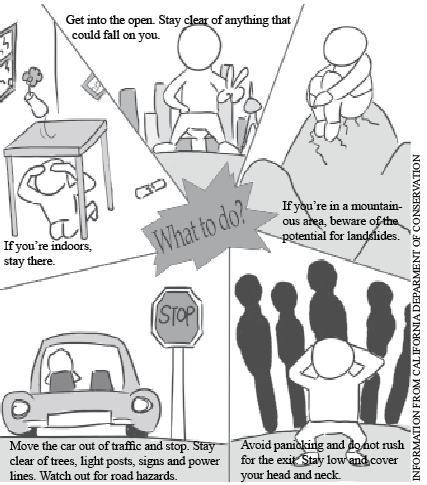Earthquake Rattles La Habra and Nearby Locations

DIANA LI
DENISE TIEU
News Editors
Southern California residents experienced an unexpected 10-second jolt on the night of March 28 when a magnitude-5.1 earthquake, one of the strongest earthquakes to occur in the Los Angeles region since 2008, struck near the city of La Habra.
More than 100 aftershocks ensued; the largest aftershocks’ magnitudes ranged from 2.7 to 3.6, according to the U.S. Geographical Survey.
Though no deaths were reported, property damage, power outages and minor injuries resulted, according to the Associated Press. As stated by the Washington Post, Fullerton officials evacuated 83 residents due to foundation problems in their apartment units. In addition, a water-main break flooded Brea City Hall, which was also damaged by the quake.
The recent earthquake scares have led individuals to question when “the big one” will occur and how prepared the public is.
“On a city and state level, our construction standards aren’t as stringent as the ones in earthquake-prone countries. We don’t have the infrastructure to support recovery after a larger earthquake,” senior Sean Cho said.
Furthermore, a recent seismology study conducted by scientists from Stanford and MIT revealed that if a large earthquake occurs at the San Andreas Fault, the seismic waves will travel through 60 miles of land and eventually hit the Los Angeles Basin. According to this study, downtown L.A. will experience three times the movement from the potential earthquake than that of surrounding areas.
“[Due to] the wave-guide and basin effects that funnel waves from the San Andreas Fault into the Los Angeles Basin where the waves are trapped and amplified […], the threat posed by earthquakes to Los Angeles is higher than it would be otherwise because those earthquakes will shake Los Angeles more strongly,” lead professor of the study Greg Beroza said, according to L.A. Weekly.
While there is no definitive way to predict when an earthquake will occur, preparation for the event is still within citizens’ control.
“[The earthquake was] just another subtle reminder that we should keep safe. It’s best to practice with your family the procedure to take in case an earthquake hits,” Red Cross member Phillip Tang said. “If your family doesn’t know what to do, it should be your job to teach them.”